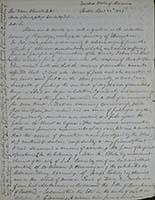Identity area
Reference code
Title
Date(s)
- 24 Apr. 1849 (Creation)
Level of description
Extent and medium
4 pp
Context area
Name of creator
Repository
Archival history
Immediate source of acquisition or transfer
Content and structure area
Scope and content
Boston, USA - CTJ's place in the history of the inductive science of physiology, relating to the discovery of etherism. He gives an account of his experience with ether. His experiments 'led me to conclude that the nerves of sensation were paralysed by the ether, and I ventured to declare confidently to my friends, that I had discovered a means of averting the pain of surgical operations'. CTJ wants WW to sanction his claim as the discoverer of the application of ether in surgical operations.
Appraisal, destruction and scheduling
Accruals
System of arrangement
Conditions of access and use area
Conditions governing access
Conditions governing reproduction
Language of material
Script of material
Language and script notes
Physical characteristics and technical requirements
Finding aids
Allied materials area
Existence and location of originals
Existence and location of copies
Related units of description
Notes area
Note
William T G Morton, a student of CTJ's, had demonstrated to a group of students and physicians in October 1846 the use of ether as a general anesthetic, and applied for a patent. CTJ in turn claimed he had discovered it. He also claimed to have told Samuel F. B. Morse the principles of the electric telegraph which Morse had patented in 1840. In 1873 he was committed to McLean Hospital as mentally ill. See his entry in the DSB by George E. Gifford, Jr., Vol. VII, pp. 44-46]

